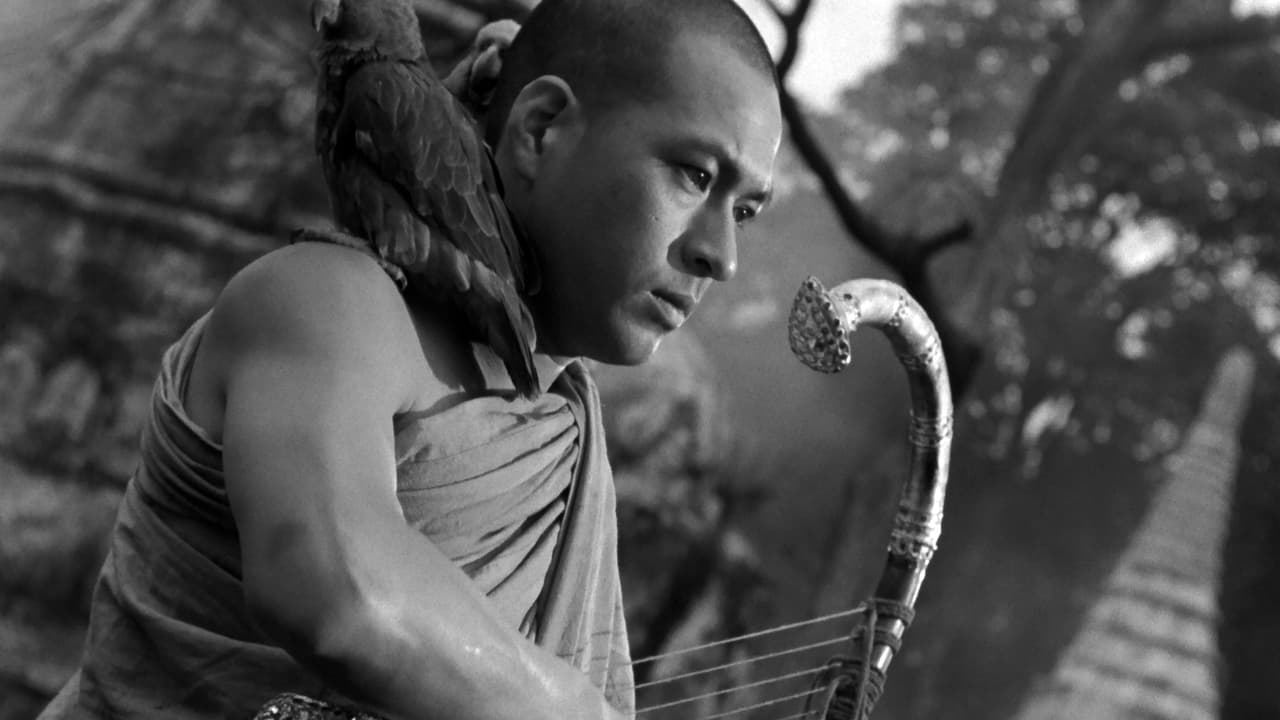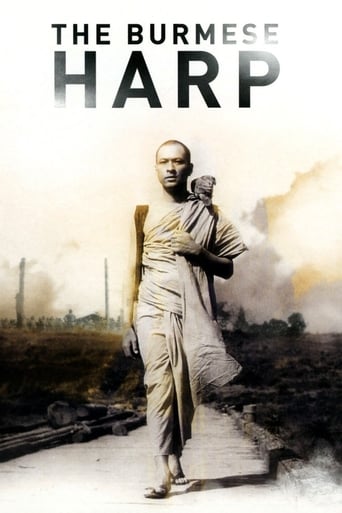



Instead, you get a movie that's enjoyable enough, but leaves you feeling like it could have been much, much more.
View MoreThe performances transcend the film's tropes, grounding it in characters that feel more complete than this subgenre often produces.
View MoreI enjoyed watching this film and would recommend other to give it a try , (as I am) but this movie, although enjoyable to watch due to the better than average acting fails to add anything new to its storyline that is all too familiar to these types of movies.
View MoreThe movie is made so realistic it has a lot of that WoW feeling at the right moments and never tooo over the top. the suspense is done so well and the emotion is felt. Very well put together with the music and all.
View MoreBurmese Harp (1956) directed by Kon Ichikawa is an emotional and thought-provoking drama that basically reveals the difficulties Japanese soldiers had to cope with as the consequence of surrendering to British army at the end of World War II. Although one group of soldiers agrees to surrender to the British, there is another group that would rather give their lives for Japan than to give up. Hence, the protagonist of the movie Mizushima, is sent to convince the other troop to surrender and «rebuild» the country again. However, Mizushima fails to accomplish his goal and persuade the soldiers of second group, which is why British army bombarded this group and killed everyone except for Mizushima himself. Although Mizushima's troop gets informed that their fellow soldier died, they still attempt to find him and look for any information about him. Meanwhile, Mizushima becomes a monk who decides to return to this motherland, Japan, only after burying the bodies of his countrymen.The movie seems to be very different from other US or European movies about the World War II. The main peculiarity of this movie is that it shows strong spirit and patriotism of Japanese soldiers almost in every scene. Their patriotism can be discussed from two different perspectives. The first example of loyalty to motherland is shown in second groups' decision to die rather than to capitulate. It depicts that their love for the country is much higher and more important than fear of death. Moreover, the first troop's decision to surrender to the British army for the sake of their own country is also a sign of patriotism. Even though it may seem quite paradoxical at first glance, this decision, very painful and at the same time deliberate, is the only source of considerable hope for the future which gives them an opportunity to start everything from the scratch. Hence, these two scenes illustrate deep sense of patriotism of Japanese people to their motherland. The movie's another peculiarity is the way it demonstrates the role of Buddhism during the time of war both for Japanese and Burmese society. There are some particular details in the film that give characteristics of Buddhism such as temples and statues of Buddha. It is shown in the movie explicitly that people had much respect for the Buddhist monks, for instance it is an honor for the citizens to provide monks food. Nevertheless, there might be one significant concern regarding the case of Mizushima. It is clearly seen that Mizushima did not have deep understanding about Buddhism as a religion, since he probably became a monk not due to pure faith, but due to an occasion. It is likely that he was influenced by a monk who took care of him after the attack of British army. Also as an experienced soldier hitherto, he was mostly driven by a tribute to the memory of the dead soldiers. Still throughout the film it can be noticed that his thoughts and perspectives seem to coincide with basic Buddhist concepts such as Four Noble Truths. In particular, the last scene is important in this context for it emphasizes the First Noble Truth stating that «Life is suffering».Taking into account the fact that the movie was shot in the second half of 20th century, I was delighted with the director's work and montage. The quality and content of the movie are quite impressive; they show that Japanese cinematography was developed pretty well even at that time and made its own contribution in a worldwide scale. Every scene is used properly to deliver main point. Also, emphasis put on separate details, such as harp played, a symbolic role in conveying collective spirit of the soldiers and their attempts to get more or less positive approach during such a hard time. The mere name of the movie, Burmese Harp, serves as a depiction of main topics illustrated in the film: patriotism, teamwork, respect, hardships of that time and more importantly hope. In general, Burmese harp (1956) not only managed to fully convey the feelings of Japanese soldiers at the time of surrender, but also to inspire people to stay strong and maintain hope for a better future.
View MoreThe story line has been repeatedly described in other reviews, and was a magnificent one, of humanity, loyalty, and compassion. The production values were superb: cinematography, authenticity, acting, and especially music. The chorale of Japanese soldiers was amazing and the Burmese harp melodies were lovely. The exchange of Japanese and English versions of "There's No place Like Home" by British and Japanese soldiers nearly confronting each other at night was awesome. This is definitely one of the best movies, Japanese or otherwise, I have ever seen.I hope a DVD is now available; I saw it on Turner Classic Movies.
View MoreThis is really a terrific film, one which I saw during my tour of duty at Itazuke AB, Fukuoka, Japan(59-62). I saw it in the "Film Tower," a six-story building, with some eight theaters of different sizes. It seemed the largest one always had John Wayne, and the one adjacent always had a Japanese war film. They were both sold out for every showing. I was twenty- one years old in 1959. It seems to have stood the test of time quite well. I feel the same sense of isolation now as then. Only John Wayne films and the American and Spaghetti Westerns drew larger crowds. There was always a disabled Japanese soldier with an upturned uniform cap and a hand-lettered sign asking for help. I always put something in the hat. Now that I am a disabled combat veteran of Vietnam, I wish it had been more, but I only made $34.00 a pay day. Thank you.
View More"The Burmese Harp" meditates brilliantly on comradeship, killing, surcease from killing, guilt, remorse and reverence for the dead. From early in his career, this supple and nuanced story discloses Ichikawa to have a subtle mind that operated on many levels. Ichikawa's outsize talent would soon be declared in full force by "Fires on the Plain." This film broods on horror that one man tries to stop, and cannot, and spends the rest of his life in penance for. The story arc celebrates Buddhist thinking, and has such universal themes of guilt, commitment, personal accountability, isolation and shame that it could be transposed well to another place and time. Ichikawa's film occasionally tear-jerks, and some of the musical digressions could be trimmed, but "The Burmese Harp" is anchored by a deft human touch and a pervasive sense of ethnicity-transcending universality. Minoru Yokoyama, the cinematographer, has lovingly lensed this film with an attitude of creating iconography, which he has. Shoji Yasui's performance as Mizushima is one in which muses ever sing.
View More